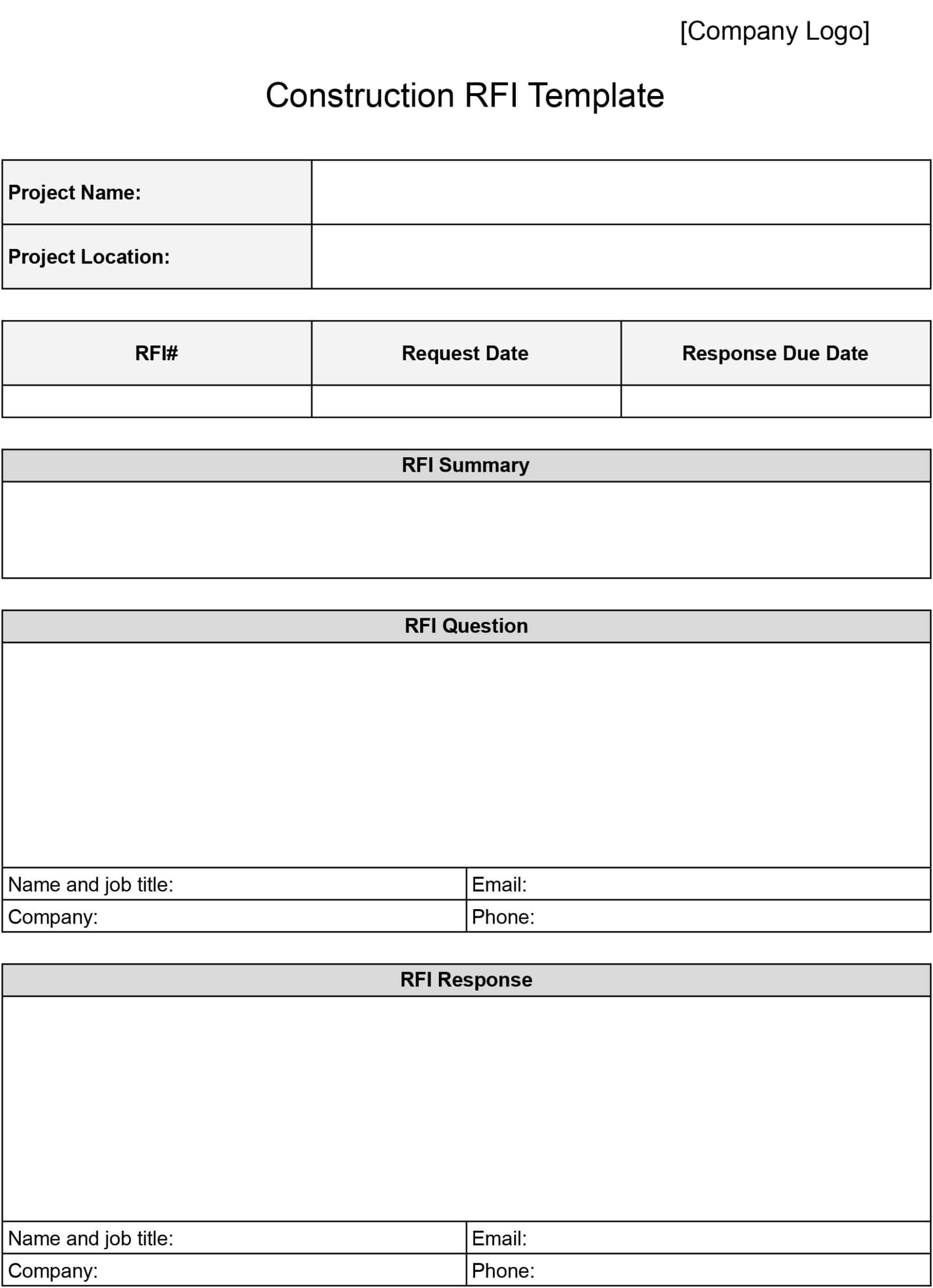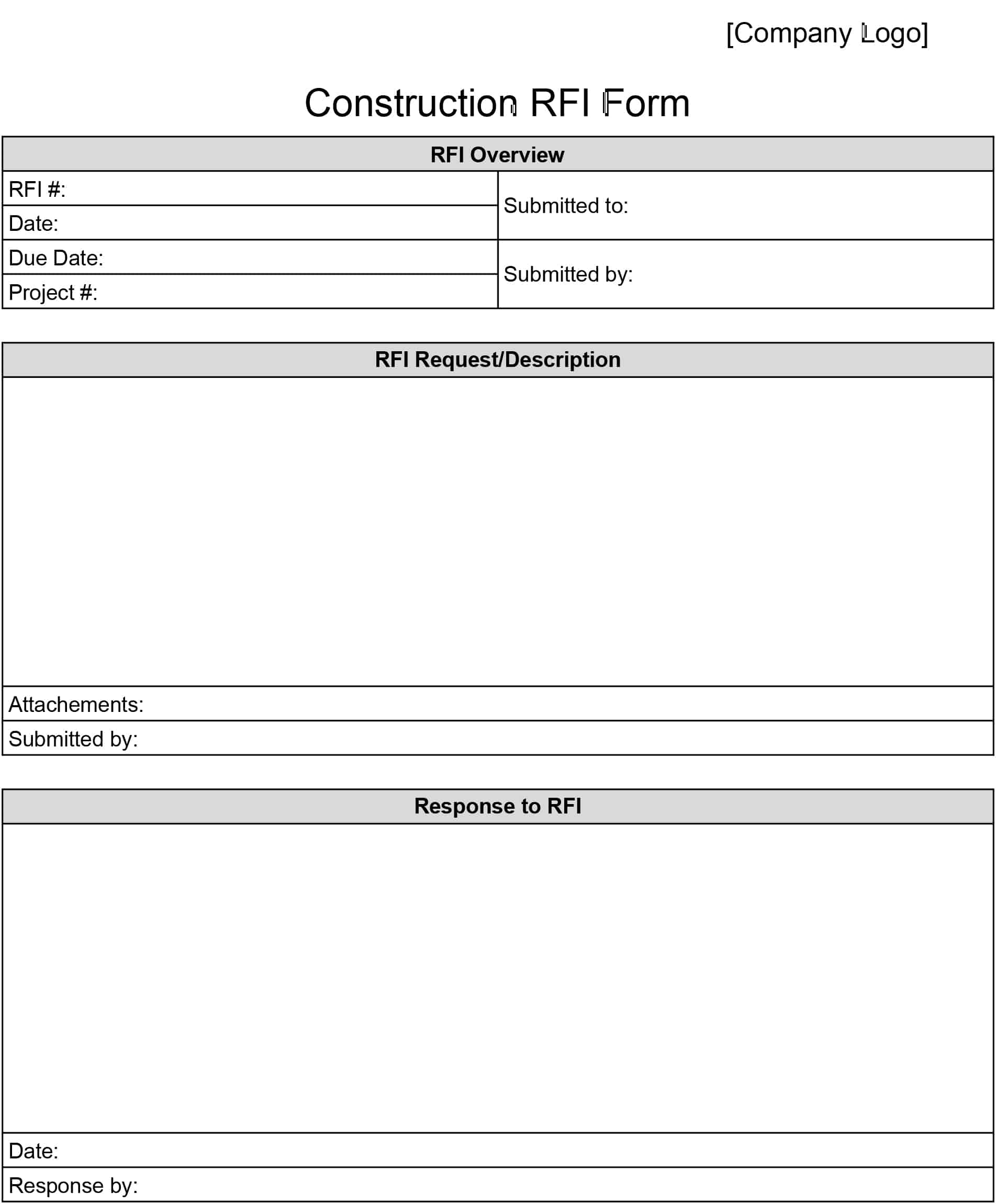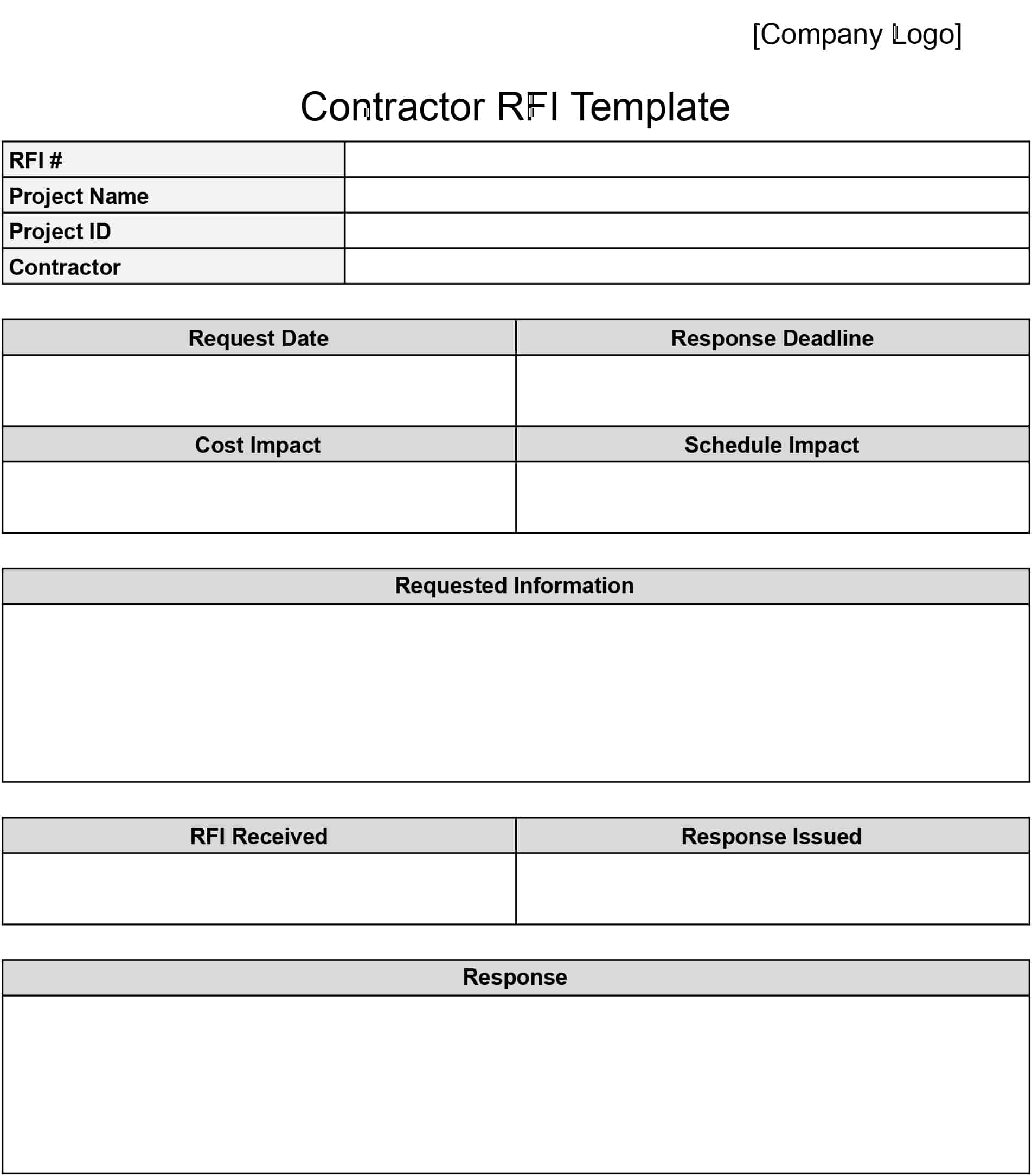In construction, clear communication is key to avoiding delays, costly mistakes, or misunderstandings. However, more than half of the contractors still rely on manual processes to manage project data. These outdated methods can slow down communication, making it harder to resolve issues quickly.
A Request for Information (RFI) is a simple but powerful document used to clarify project details and ensure everyone is on the same page. With RFIs, you can avoid confusion, streamline communication, and keep projects moving smoothly.
We have created RFI templates that you can use for free:
- Construction RFI Template
- Construction RFI Form
- Contractor RFI Template
Our free construction RFI templates are designed for contractors, project managers, and architects. Available in PDF, Word, Excel, and Google formats, these templates are easy to use and fully customizable.
Start using them today to save time, resolve issues faster, and improve collaboration on your projects!
Templates by Type
- Construction RFI Template
- Construction RFI Form
- Contractor RFI Template
Construction RFI Template
This general-purpose RFI template is perfect for requesting clarifications on construction projects. It ensures that all questions are documented clearly and addressed promptly, minimizing delays caused by miscommunication.
Whether you’re a contractor or project manager, this template offers a structured format for formal communication, improving collaboration and maintaining thorough records.
How to Get These Templates:
-
PDF
- Click the link
- Click the Download icon in the upper right
-
Microsoft Word (.DOCX) and Excel (.XLSX)
- Click the link
- Open the File menu in the upper right
- Click Download
- Select .docx (Word) or .xlsx (Excel)
-
Google Docs and Sheets:
- Click the link
- You must be logged into a Google Drive account
- Open the File menu in the upper right
- Click Make a Copy
How to Use These Templates:
- Basic Information Fields: Add project name, RFI number, and submission date.
- Question Details: Clearly state your query and reference specific project documents.
- Response Section: Dedicated space for responses, additional clarifications, or attachments.
Construction RFI Form
Specifically designed for construction projects, this form standardizes the process of requesting information. It ensures that all necessary details are communicated efficiently to stakeholders.
This template supports better collaboration by providing a clear structure, helping teams resolve questions quickly and accurately.
How to Get These Templates:
-
PDF
- Click the link
- Click the Download icon in the upper right
-
Microsoft Word (.DOCX) and Excel (.XLSX)
- Click the link
- Open the File menu in the upper right
- Click Download
- Select .docx (Word) or .xlsx (Excel)
-
Google Docs and Sheets:
- Click the link
- You must be logged into a Google Drive account
- Open the File menu in the upper right
- Click Make a Copy
How to Use These Templates:
- Detailed Query Fields: Include sections for context, questions, and required responses.
- Attachment Options: Add supporting documents or references.
- Approval Section: Fields for signatures and official approval dates.
Contractor RFI Template
Tailored for contractors, this template simplifies the process of seeking clarifications from architects, clients, or project managers. It ensures clarity and accountability throughout the project.
Using this template helps contractors prevent misunderstandings and keep projects on track.
How to Get These Templates:
-
PDF
- Click the link
- Click the Download icon in the upper right
-
Microsoft Word (.DOCX) and Excel (.XLSX)
- Click the link
- Open the File menu in the upper right
- Click Download
- Select .docx (Word) or .xlsx (Excel)
-
Google Docs and Sheets:
- Click the link
- You must be logged into a Google Drive account
- Open the File menu in the upper right
- Click Make a Copy
How to Use These Templates:
- Project-Specific Details: Reference contract documents and drawings.
- Contractor Queries: Clearly state contractor-specific questions.
- Timeline Tracking: Record response deadlines and action items.
Looking for a better way to manage construction business data? Try Workyard!
See how it works
What Are Construction RFI Templates?
Construction RFI templates are structured documents designed to help manage Requests for Information (RFIs) during construction projects. RFIs are formal questions submitted to clarify project details, resolve uncertainties, or address discrepancies in plans, materials, or timelines. These templates provide a standardized format to make the process easier and more efficient.
Typically, RFIs focus on areas like design inconsistencies, material specifications, or scheduling conflicts. Using templates ensures that these queries are clear, complete, and professionally presented, helping to minimize delays and miscommunication.
Key Benefits of Construction RFI Templates:
- Improved Communication: Create clear, concise queries to avoid misunderstandings.
- Time-Saving: Skip the hassle of designing forms from scratch for each RFI.
- Accountability: Maintain a thorough record of questions and responses for future reference.
- Consistency: Standardize RFIs across teams and projects for a professional look and feel.
Construction RFI templates are essential tools for keeping projects on track, promoting collaboration, and ensuring accurate communication among all stakeholders.
Good Examples of Construction RFI Template Use
Construction RFI templates are powerful tools that improve communication, clarify project details, and help resolve issues efficiently. Here are some practical ways these templates can be used effectively:
-
Clarifying Design Conflicts: Use an RFI Template Word Doc to address inconsistencies between architectural plans and engineering drawings. This ensures all stakeholders are on the same page before work continues.
-
Requesting Material Details: A Construction RFI Form can help you confirm specifications for materials that aren’t clearly defined in the project scope, ensuring choices meet both design and budget requirements.
-
Addressing Site Conditions: Contractors can use a Contractor RFI Template to report unexpected site issues, such as changes in soil conditions, and request adjustments to the project plan.
-
Tracking Multiple Queries: An RFI Template Excel is ideal for managing numerous RFIs on large projects. It helps teams monitor deadlines, responses, and progress to avoid bottlenecks.
-
Securing Approval for Changes: Use a Contractor RFI Form to formally request approval for modifications, such as material substitutions or alternative construction methods.
-
Coordinating Schedules: The RFI Template PDF can be used to clarify timeline discrepancies, ensuring all teams stay aligned with project deadlines.
Bad Examples of Construction RFI Template Use
While construction RFI templates are designed to streamline communication and improve project clarity, poor usage can lead to confusion, delays, or inefficiencies. Here are some examples of mistakes to avoid:
-
Vague or Incomplete Queries: Submitting an RFI Template Word Doc with insufficient details, like “Clarify design issue,” without referencing specific drawings or documents, can cause confusion and delay responses.
-
Overloading RFIs: Using an RFI Template Excel to combine unrelated questions into a single query log overwhelms recipients and may lead to incomplete or overlooked responses.
-
Lacking Supporting Documents: Sending an RFI Template PDF without attaching relevant materials, such as drawings, photos, or specifications, often requires follow-up clarifications, delaying resolutions.
-
Using RFIs for Minor Issues: Relying on an RFI Form to address simple questions that could be resolved through a quick conversation can overcomplicate communication and slow down decision-making.
-
Submitting Too Many RFIs: Excessive use of the Contractor RFI Template for trivial or repetitive queries can frustrate stakeholders and undermine the importance of critical RFIs.
-
Delaying Submission: Waiting too long to submit an RFI after discovering an issue, such as post-construction, can lead to costly rework and negatively impact project timelines.
A Step-By-Step Guide to Using Construction RFI Templates
Using construction RFI templates effectively can simplify communication, prevent delays, and resolve project uncertainties. Follow these steps to get the most out of your templates:
Step 1: Select the Right Template
Choose a template that best fits the type of question or clarification you need.
Use case examples:
- Construction RFI Form: Best for general inquiries about project designs, materials, or specifications.
- RFI Template Word Doc: Ideal for creating customized RFIs tailored to specific projects.
- RFI Template Excel: Perfect for tracking multiple RFIs in one centralized log.
Action: Match your chosen template to the nature of your query for clearer communication.
Step 2: Fill Out the Template Accurately
Provide all necessary details in the template to make your RFI clear and actionable.
Use case examples:
- RFI Template PDF: Record details like the RFI number, project name, and date for formal submissions.
- Contractor RFI Form: Clearly outline your query, referencing specific drawings or documents for context.
- RFI Template Word Doc: Attach additional materials, such as sketches or photos, for detailed questions.
Action: Ensure your RFI includes all relevant information to avoid unnecessary follow-ups.
Step 3: Submit the RFI to the Appropriate Party
Send your completed RFI to the right person or team for review and resolution.
Use case examples:
- Share Contractor RFIs with architects or engineers to address design questions.
- Use RFI Template Excel to assign queries to project managers for tracking and responses.
- Submit RFI Template PDFs to clients for queries related to scope or budgets.
Action: Deliver your RFI promptly to minimize delays and keep the project on schedule.
Step 4: Monitor and Track Responses
Keep track of the status of your RFIs to ensure timely resolutions.
Use case examples:
- Log RFI submissions and updates in RFI Template Excel to maintain an overview of open and closed queries.
- Use Construction RFI Forms to follow up on unanswered RFIs and escalate if necessary.
- Track deadlines and assigned responsibilities using a Contractor RFI Template.
Action: Stay proactive by monitoring progress and addressing unresolved RFIs promptly.
Step 5: Implement the Responses in the Project
Apply the information from the RFI responses to your project to keep it moving forward.
Use case examples:
- Update construction plans based on feedback from the RFI Template Word Doc.
- Adjust timelines and resources if responses from an RFI Template PDF highlight changes.
- Share revised instructions or drawings with the team after resolving queries.
Action: Use the responses effectively to maintain momentum and avoid delays.
Step 6: Store Completed RFIs for Future Reference
Organize your RFIs systematically for easy access during audits, reviews, or future projects.
Use case examples:
- Archive Contractor RFI Forms in a centralized system for compliance purposes.
- Use completed Construction RFI Forms as references for similar questions in future projects.
- Review RFI Template Excel logs to identify trends or recurring issues for process improvements.
Action: Keep your RFIs well-organized to support long-term project management and compliance.
Your Next Steps With Construction RFI Templates
Construction RFI templates are a powerful tool for resolving project questions and ensuring smooth communication. But they work even better when paired with other templates that help streamline your operations. Here’s how to expand your workflow with complementary tools:
Step 1: Ensure Quality With New Construction Walk-Through Checklists
A New Construction Walk-Through Checklist helps you inspect completed work, identify issues, and confirm that all tasks meet client expectations. It’s essential to maintain high standards before final sign-offs.
Next Step: Use walk-through checklists alongside RFIs to address outstanding questions during the final stages of construction.
Step 2: Formalize Agreements With Construction Contract Templates
A Construction Contract Template ensures all project agreements are clear and legally binding. Use it to define the scope of work, timelines, and responsibilities.
Next Step: Pair construction contracts with RFIs to document agreed-upon changes and clarify terms before work begins.
Step 3: Document Completion With Certificate of Completion Templates
A Certificate of Completion Template provides proof that a project is finished and meets the agreed standards. It helps close out projects professionally and ensures client satisfaction.
Next Step: Use certificates of completion to finalize projects after resolving all RFIs and verifying that all work is complete.
Try Construction RFI Templates in Workyard!
While templates are great for documentation, construction management software like Workyard can elevate project communication. Workyard offers advanced tracking features, centralized storage, and real-time updates for seamlessly managing RFIs.
Try Workyard free for 14 days to experience how its features can complement your templates, improve team collaboration, and enhance project efficiency.
Looking for a better way to manage construction business data? Try Workyard!
See how it works


 Excel
Excel
 Google Sheets
Google Sheets

